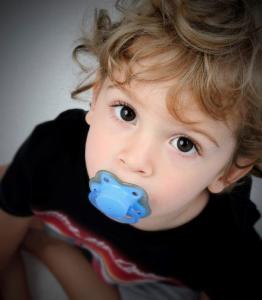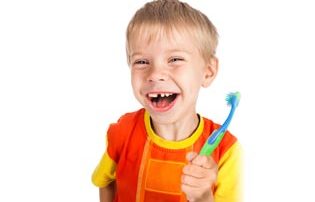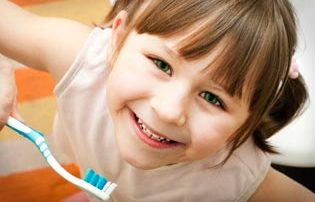Thumb and Finger Sucking
 Have you ever wondered why children have a sucking habit in the first place? Babies and toddlers naturally use sucking as a reflex to relax and comfort themselves, as well as learn more about their surrounding environment. Most children stop the habit between age 2 and 4 years, with little or no damage done to the teeth or jaws. However, the chance of dental issues depends on how frequently, how long, and how vigorously the sucking is done. Aggressive thumb or finger sucking may cause problems with baby (primary) teeth. When thumb and finger sucking continues beyond the eruption of their permanent teeth, the habit can cause misalignment of the teeth and improper growth. If you notice prolonged and/or intense thumb or finger sucking patterns with your child, please talk to Dr. Christianson and our team.
Have you ever wondered why children have a sucking habit in the first place? Babies and toddlers naturally use sucking as a reflex to relax and comfort themselves, as well as learn more about their surrounding environment. Most children stop the habit between age 2 and 4 years, with little or no damage done to the teeth or jaws. However, the chance of dental issues depends on how frequently, how long, and how vigorously the sucking is done. Aggressive thumb or finger sucking may cause problems with baby (primary) teeth. When thumb and finger sucking continues beyond the eruption of their permanent teeth, the habit can cause misalignment of the teeth and improper growth. If you notice prolonged and/or intense thumb or finger sucking patterns with your child, please talk to Dr. Christianson and our team.
Here are a few tips to help your child outgrow thumb or finger sucking:
![]() Don’t punish a child when they’ve exhibited thumb or finger sucking behavior; instead, applaud your child when they don’t thumb suck.
Don’t punish a child when they’ve exhibited thumb or finger sucking behavior; instead, applaud your child when they don’t thumb suck.
![]() There’s a great book to buy for your children called David Decides About Thumbsucking. By Susan M. Heiter, Ph.D., you can find this book at any major book retailer or on Amazon. It’s Published by “Reading Matters:” P.O. Box 300309 Denver CO, 80203
There’s a great book to buy for your children called David Decides About Thumbsucking. By Susan M. Heiter, Ph.D., you can find this book at any major book retailer or on Amazon. It’s Published by “Reading Matters:” P.O. Box 300309 Denver CO, 80203
![]() Use a calendar with a colored marker or colorful stickers to track their success in stopping the habit. You can print one of these calendars from our website. It can be found under “motivational charts.”
Use a calendar with a colored marker or colorful stickers to track their success in stopping the habit. You can print one of these calendars from our website. It can be found under “motivational charts.”
![]() Put a sock on their hand, or wrap their finger/thumb in a bandage at night.
Put a sock on their hand, or wrap their finger/thumb in a bandage at night.
![]() If the habit continues, talk to Dr. Christianson or your pediatrician. He or she may recommend the use of a “thumb-habit appliance” or a bitter-tasting liquid such as Mavala Stop, to coat the thumb or thumbnail and discourage sucking.
If the habit continues, talk to Dr. Christianson or your pediatrician. He or she may recommend the use of a “thumb-habit appliance” or a bitter-tasting liquid such as Mavala Stop, to coat the thumb or thumbnail and discourage sucking.
When your child is old enough to understand the potential results of the habit, Dr. Christianson can encourage your child to stop, as well as talk about what happens to the teeth if they continue. Our team is always happy to answer questions about “thumb-habit appliances” or Mavala Stop.
Pacifiers
 Finger and pacifier habits essentially affect the teeth the same way. However a pacifier habit is usually easier to break, especially if the parent does not get into the habit of allowing the child to keep the pacifier in his/her mouth for extended periods of time. It is not recommended that children use pacifiers after age 2, in fact you should start weaning the child around 18 months. Prolonged pacifier use can produce harmful misalignment and tongue thrust. The weaning process should only take a few days. Some parents find success by poking a hole in the tip of the pacifier’s nipple or progressively cutting the end of the nipple. Remember to assure your child that they are fine without the pacifier, and that you are proud of them for giving it up. It’s also acceptable to give them a stuffed animal to hold as a substitute while they fall asleep.
Finger and pacifier habits essentially affect the teeth the same way. However a pacifier habit is usually easier to break, especially if the parent does not get into the habit of allowing the child to keep the pacifier in his/her mouth for extended periods of time. It is not recommended that children use pacifiers after age 2, in fact you should start weaning the child around 18 months. Prolonged pacifier use can produce harmful misalignment and tongue thrust. The weaning process should only take a few days. Some parents find success by poking a hole in the tip of the pacifier’s nipple or progressively cutting the end of the nipple. Remember to assure your child that they are fine without the pacifier, and that you are proud of them for giving it up. It’s also acceptable to give them a stuffed animal to hold as a substitute while they fall asleep.











